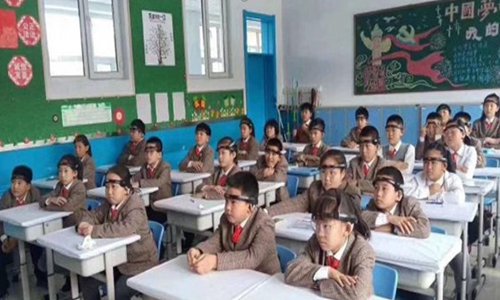
(Photo: Global Times)
A US-based brain research company is under fire in China after a photo of a group of Chinese students wearing its head-band device went viral.
BrainCo said on Thursday night that the controversial picture showing Chinese pupils wearing brain-bands was from an experiment with their product.
"The picture was from an experiment on lifting children's focus in a study we undertook in March," Yang Zhangpeng, head of public relations in BrianCo, told the Global Times on Thursday.
The experiment took place in Jiangnan Experimental School of Mudanjiang, Northeast China's Heilongjiang Province, according to Yang.
He said that students of two classes took part in the experiment, during which one class of around 40 children were wearing their devices, which could detect their brain activities in order to record their level of attention. The other class of students served as the control group. The company believed that through recording and certain training, children's attention could be elevated.
"Before the experiment, we acquired the consent of parents and the school. The school was happy about it," Yang said.
The Boston-based BrianCo opened its Chinese company in December 2018. The company aimed to promote their devices and training courses to families and afterschool agencies that promote lifting students' attention in studying.
Yang said their product targeted primary school and junior high school students, but now many college students who are preparing for postgraduate entrance exams are their consumers.
On BrianCo's online shop on ecommerce giant JD.com, 10 or 20 of their products, each priced at 3,499 yuan, are sold every day.
The picture which was posted earlier this month on Sina Weibo showed dozens of students in uniform sitting in a classroom, wearing head-band devices. Other pictures showed the software for supervising and recording children's attention during class, according to a report by supchina.com on April 5.
The pictures went viral among the media. A report by Italy's La Republica called it a "horror scene."
Chu Zhaohui, a research fellow at the National Institute of Education Sciences, told the Global Times on Thursday that "if the event was a single experiment, it was fine, but schools should not wish to improve children's attention through such trainings."
Chu noted that children's attention is dependent on the subject. "If they are interested in the subject, they will naturally pay attention." He suggested lessons could be designed to be more interesting and children could play more active roles in studying.
"If a certain child has less attention, they could be corrected through some methods. But the correction should not be applied to a whole class of students," Chu said.


